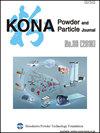阴离子和阳离子对水介质中氧化铁纳米颗粒形成的影响
IF 3.2
4区 材料科学
Q3 ENGINEERING, CHEMICAL
引用次数: 1
摘要
近年来,各种功能化金属氧化物纳米颗粒由于其独特的化学和物理性质而得到了广泛的应用。为了合成金属氧化物纳米颗粒,液相合成技术得到了发展。水介质中金属氧化物纳米颗粒的生产过程极其复杂,因为颗粒的形成、晶体结构、结晶度、化学组成和形态在很大程度上取决于制备条件(例如阴离子和阳离子的浓度和种类、添加剂、溶液pH、反应温度和时间)。因此,阐明这些效应是准确理解金属氧化物纳米颗粒形成机制的基础,是进一步开发新型功能化纳米颗粒的基础。本文综述了阴离子(Cl -、so42 -和no3 -)和阳离子(ni2 +、cu2 +和cr3 +)对水介质中氧化铁纳米颗粒形成和结构的影响。本文章由计算机程序翻译,如有差异,请以英文原文为准。
Influence of Anions and Cations on the Formation of Iron Oxide Nanoparticles in Aqueous Media
Recently, various types of functionalized metal oxide nanoparticles have been used for many applications because of their unique chemical and physical properties. To synthesize metal oxide nanoparticles, liquid-phase synthesis techniques have been developed. The production process of metal oxide nanoparticles in aqueous media is extremely complex because the formation, crystal structure, crystallinity, chemical composition, and morphology of the particles are considerably dependent on the preparation conditions (e.g., anion and cation concentrations and species, additives, solution pH, and reaction temperature and time). Accordingly, clarifying these effects is fundamental to accurately understand the formation mechanism of metal oxide nanoparticles to further develop new functionalized nanoparticles. In this review, the influence of anions (Cl – , SO 42– , and NO 3– ) and cations (Ni 2+ , Cu 2+ , and Cr 3+ ) on the formation and structure of iron oxide nanoparticles in aqueous media is described.
求助全文
通过发布文献求助,成功后即可免费获取论文全文。
去求助
来源期刊

KONA Powder and Particle Journal
工程技术-材料科学:综合
CiteScore
8.40
自引率
4.90%
发文量
35
审稿时长
>12 weeks
期刊介绍:
KONA publishes papers in the broad field of powder science and technology, ranging from fundamental principles to practical applications. Papers describing technological experience and critical reviews of existing knowledge in special areas are also welcome.
 求助内容:
求助内容: 应助结果提醒方式:
应助结果提醒方式:


